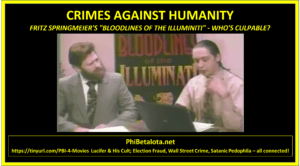**DO NOT MISS THE #UNRIG TRUTH TOUR! https://bigbatusa.org 15 May to 6 September — EPIC!**
Alert reader writes in:
FRITZ SPRIMGMEIER TALKS ABOUT THE TOP “ILLUMINATI” FAMILIES
In this interview, Fritz Springmeier talks about the top “Illuminati” families and how MOST Zionists in the world are NOT EVEN JEWISH:

Continue reading “Mongoose: Zionists Not Jewish, Fatal to Judaism – Serve Deep State Illuminati”





 ESRI, who?
ESRI, who?